Free is great, especially when starting a new business! You can begin strong and stretch your resources without going over budget by using free small business software.
While concerns about quality are legitimate, proper free business management software can be reliable and powerful. They can help your company develop and succeed in the beginning, allowing you to upgrade when necessary.
Here is a list of the top free small business management software to assist you in selecting the best! But before that, let’s know about the various types of software that businesses need.
Top 8 Free Business Management Software Solutions
Let’s explore the best free business management software solutions to streamline your operations and boost productivity without compromising on quality.
| Software Name | Best For | Key Features | Pricing | Unique Differentiator |
|---|---|---|---|---|
| CallHippo | Business communication & virtual phone systems | Call management, IVR, analytics, call recording, integrations | Free plan available; premium starts at $16/month | Cloud-based calling with global number support in 100+ countries |
| Trello | Project tracking and task collaboration | Boards, lists, cards, task automation, integrations | Free plan; paid plans start at $5/user/month | Visual Kanban interface for simple project management |
| Monday.com | Team workflows and automation | Custom workflows, dashboards, automation, time tracking | Free plan; paid plans start at $8/seat/month | Highly customizable workflows with 200+ templates |
| Asana | Work management and productivity tracking | Project timelines, task dependencies, reporting, automation | Free plan; paid starts at $10.99/user/month | Great for cross-functional team collaboration and deadlines |
| Zoho CRM | Customer relationship management | Lead management, workflow automation, email tracking, reports | Free for up to 3 users; paid starts at $14/user/month | Complete CRM suite with AI-powered insights (Zia) |
1. CallHippo
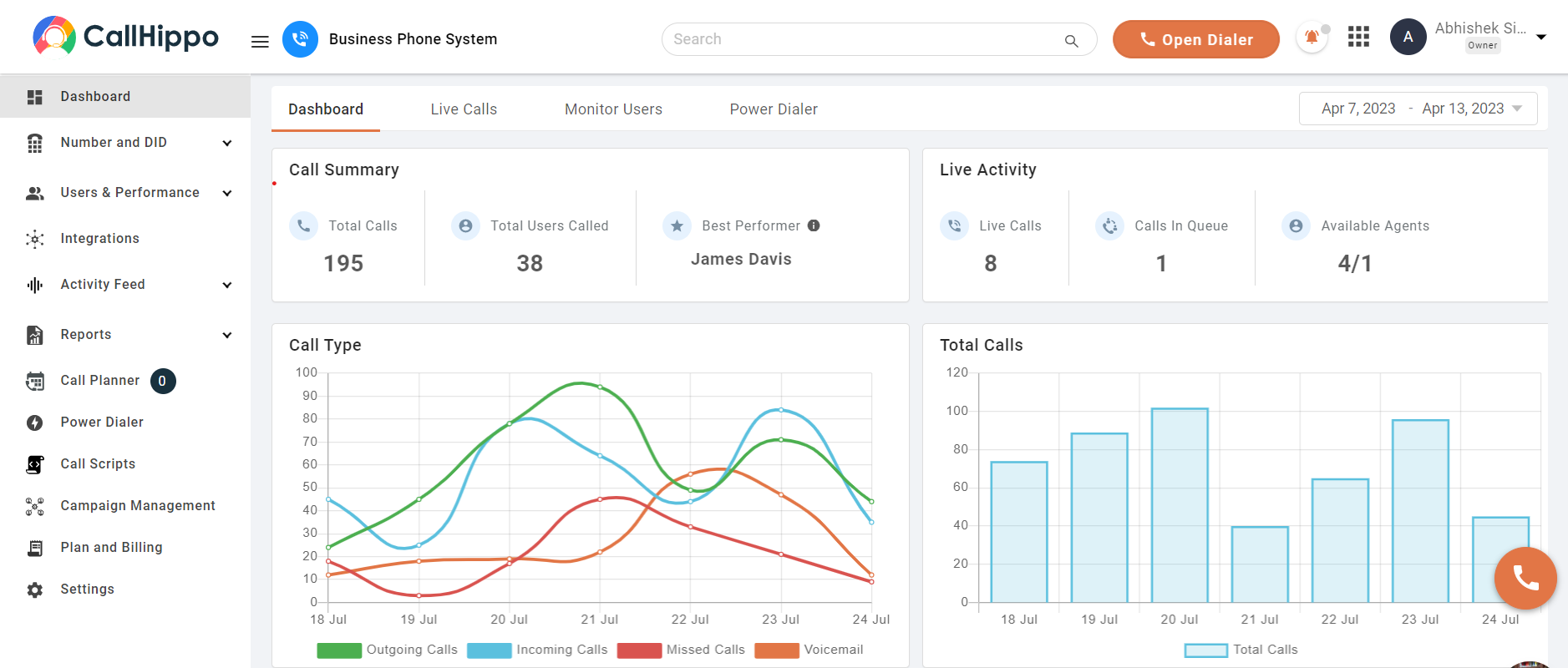
CallHippo is a free number provider that improves business communication. It has advanced features like international phone numbers, bulk SMS/MMS, and call center analytics. It provides quality control features like record calls and call monitoring, and it streamlines outbound interactions with auto dialer and predictive dialer.
It offers features like call queues and smart call forwarding, guaranteeing effective management of incoming calls. This free business management software is a complete solution for modern company telephone demands, enabling teams to collaborate easily.
Key Features
- Automated routing
- Call recording
- Conference call
- Contact management
- Voice customization
- Queue management
Best for: Organizations that need to streamline business communication effectively.
Pros
- Integrates well with Pipedrive and responsive customer service.
- The tool has a user-friendly dashboard and is of great value for money.
- Excellent call forwarding software with seamless web and app call answering.
Cons
- Technical glitches and call quality issues in low network coverage areas.
- Pushy with discounts, refusal to refund after cancellation requests.
2. Trello
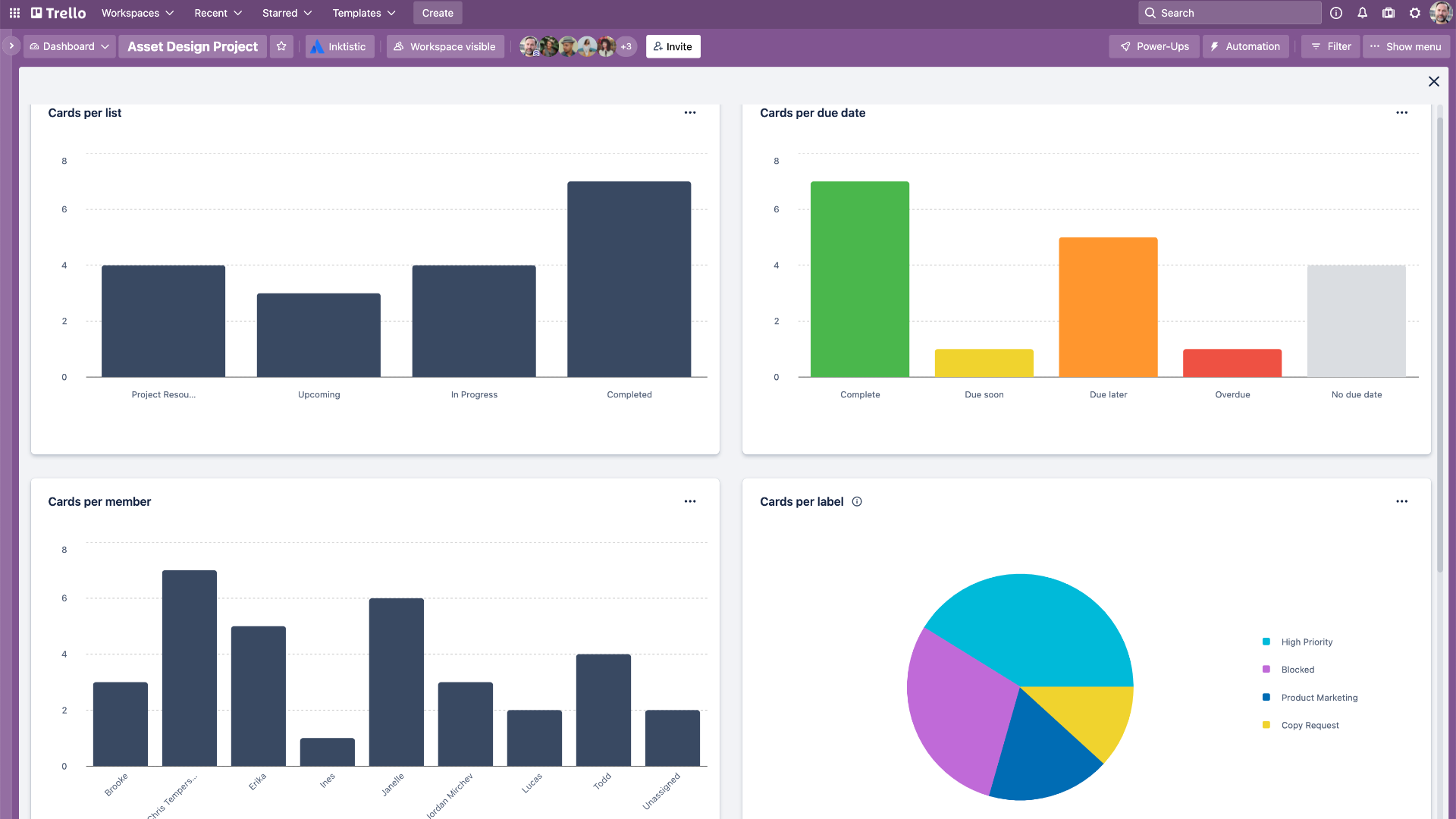
Trello is a visual collaboration tool for task and project planning used by a variety of departments, including marketing, sales, support, and HR. However, it is most commonly adopted by agile software development teams.
Project definition, requirement setting, and workflow management are all made possible by this free small business management software, which guarantees organized project execution. Trello cards provide for easy teamwork by letting users add teammates, leave comments, and attach files to projects.
Key Features
- Budget management
- Data synchronization
- Guest access
- KPI monitoring
- Process modeling and designing
Best for: Project management and cross-team collaboration.
Pros
- Organizes tasks and users in real time with cards and checklists.
- Customizable templates streamline processes for different project types.
- Dashboard provides a clear overview of ongoing projects and task status.
Cons
- Limited formatting options like adding line breaks to steps.
- Lack of feature for making mass edits across multiple cards.
3. Monday.com
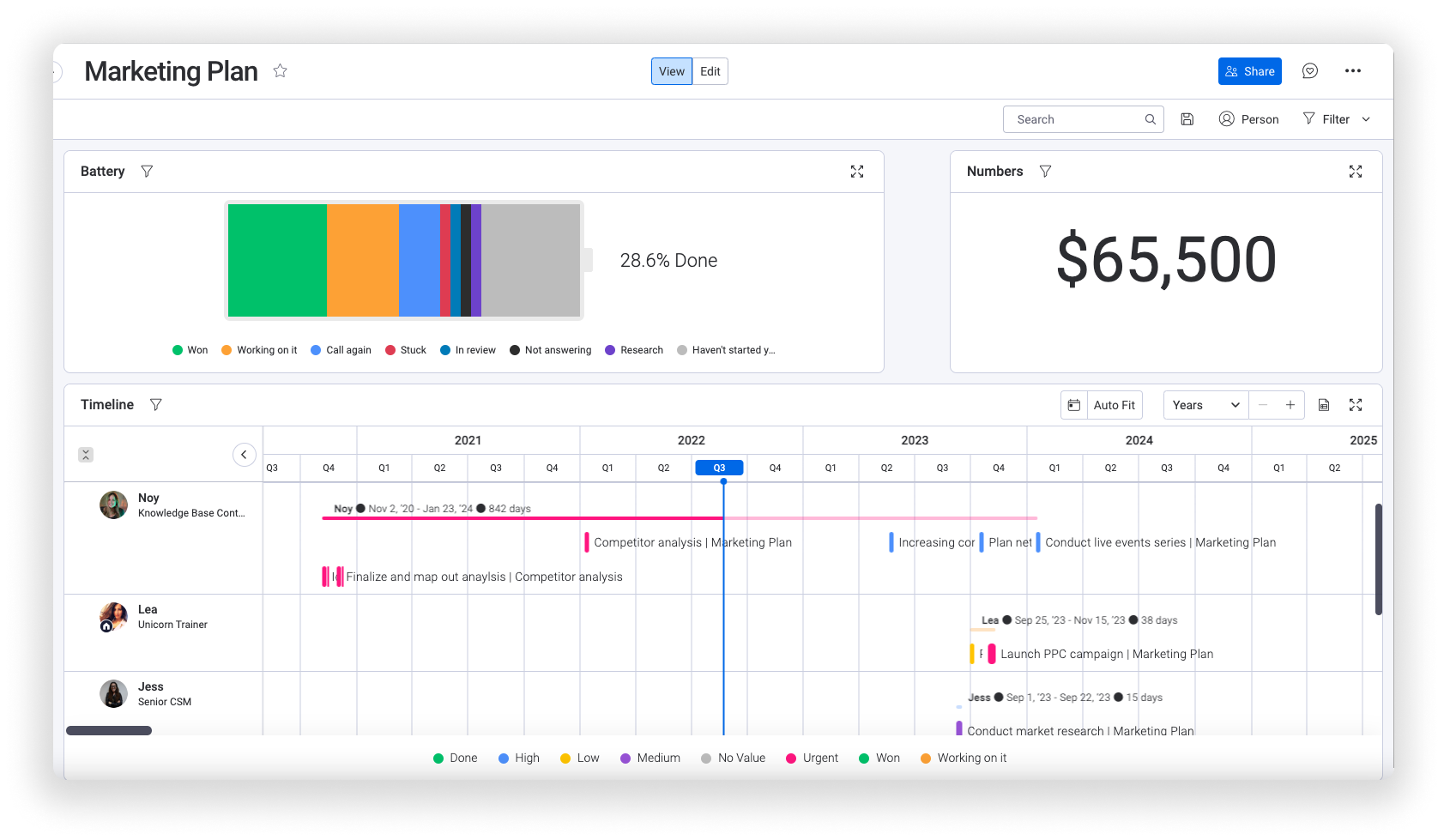
Monday.com is a flexible cloud-based work OS that enables teams to easily and without coding construct unique workflow apps. It lets teams automate time-consuming tasks, improve teamwork, and quickly adjust to changing needs.
This free small business software has customizable workflow templates for a range of management requirements. It also has extensive time-tracking features to guarantee project delivery on schedule and automated workflows to optimize efficiency and smooth integrations.
Key Features
- Brand tracking
- Email marketing
- Job scheduling
- Metadata management
- Campaign tracking
Best for: Workflow automation and project management.
Pros
- Comprehensive options for off-site event management, including attendee management.
- Intuitive customization for specific multi-site and time panel needs.
- Efficient management of attendees throughout the event lifecycle.
Cons
- Limited options for full event management without customization.
- Complex user interface hindered navigation and initial adoption efforts.
4. Asana
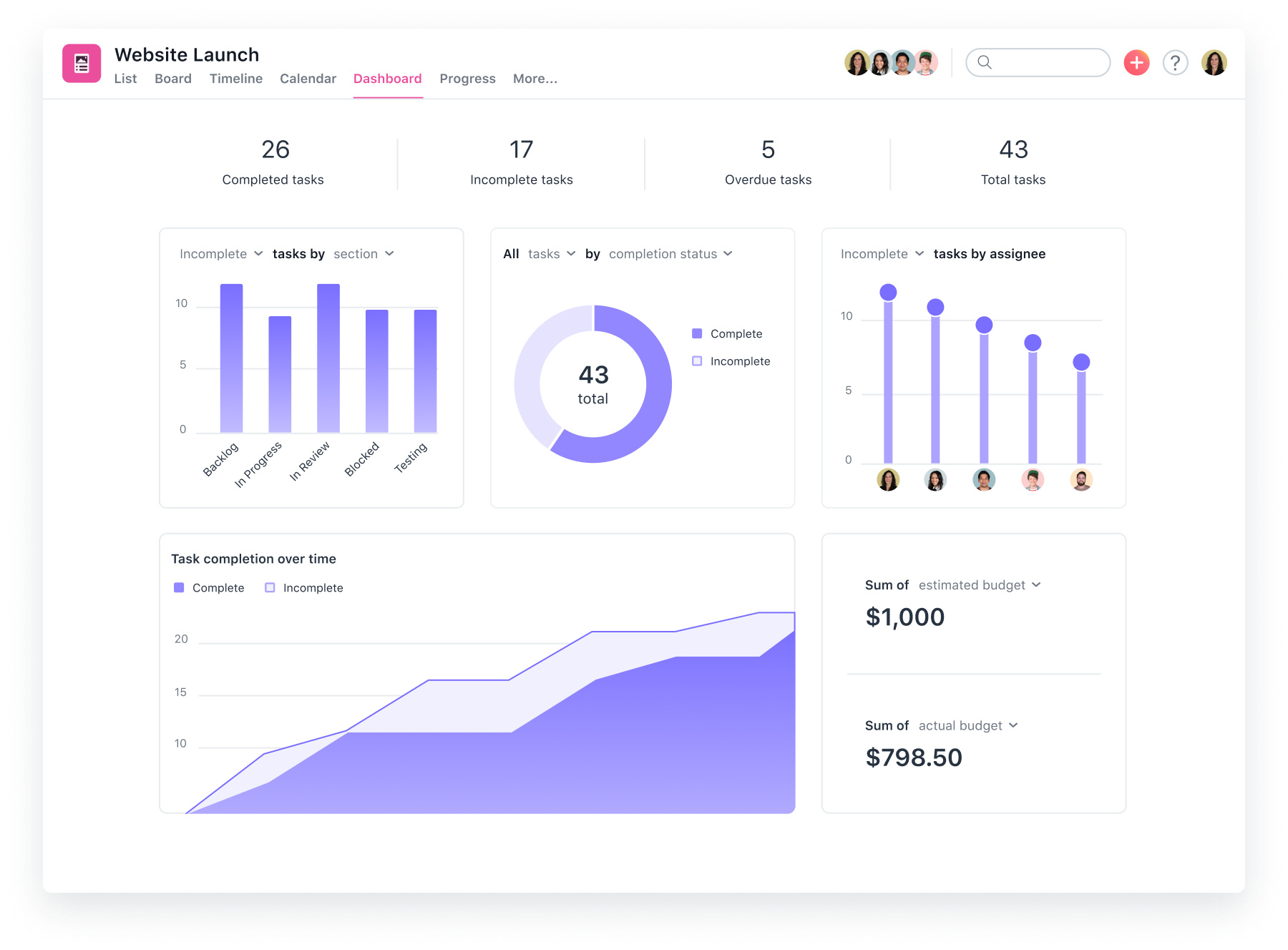
Asana promotes the smooth management of work among teams, increasing productivity for both daily tasks and long-term goals. No matter the size or location of the department, teams become more confident and productive. Asana is a free business management software that enables the management of digital transitions and intricate projects like new product launches.
To improve team visibility and stakeholder insights, users can easily generate real-time project reports and track initiative statuses, guaranteeing visible progress toward targets.
Key Features
- Assignment management
- KPI monitoring
- Process change tracking
- Risk management
- Task progress tracking
Best for: Teams looking to streamline task management.
Pros
- Clean interface with multiple project and category support.
- Easy team collaboration with task assignment and monitoring.
- Customizable work areas tailored to business needs.
Cons
- Lacks features compared to other apps.
- Can be overwhelming with potential tasks and capabilities.
5. Zoho CRM

Zoho CRM is a customer relationship management tool that helps businesses all over the world manage their operations and build long-lasting relationships with their clients. This free business management software can be tailored to any industry; companies can cultivate client relationships via phone, email, live chat, and social media. Users are kept updated about new contacts and interactions with customers through automatic notifications.
With its adaptable UI, this all-in-one business management software free ensures a CRM system that is specifically designed to fit the needs of any organization.
Key Features
- Conversion tracking
- Channel management
- Goal management
- Marketing automation
- Sales forecasting
Best for: Organizations looking for an all-in-one CRM software.
Pros
- Deep customization options enhance business efficiency.
- Seamless integrations with numerous applications.
- User-friendly interface simplifies customer management.
Cons
- Navigation and customization can be challenging.
- The mobile app lacks full desktop functionality.
6. Hubspot CRM
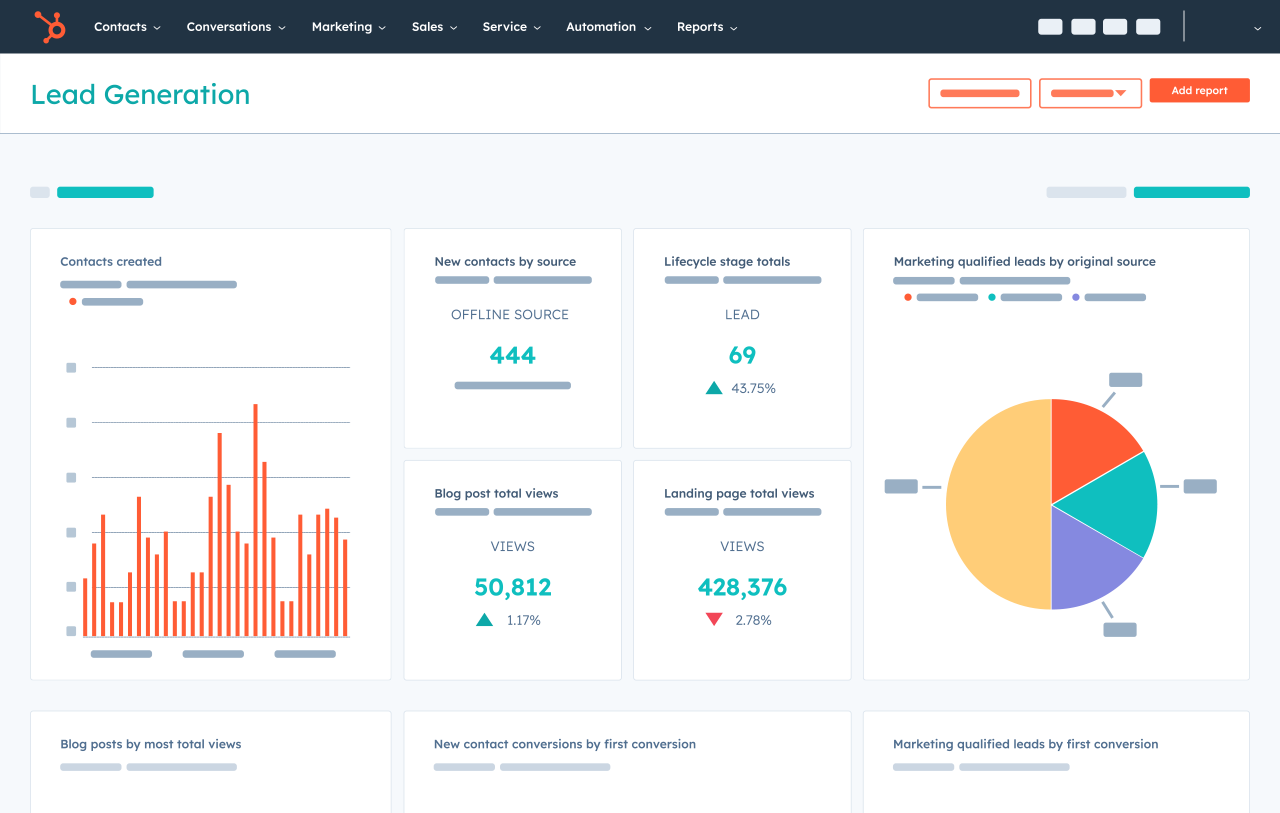
HubSpot CRM is a cloud-based tool that helps companies of all sizes track leads, build relationships, and analyze analytics. Many industries, including accountancy, marketing, sales, construction, retail, and real estate, could gain greatly from it.
This free business management software keeps track of all customer interactions automatically through phone calls, emails, social media, and live chat, organizing them into a timeline with leads at the top. To manage templates and monitor email success, HubSpot CRM also provides lead generation and email marketing automation.
Key Features
- Appointment scheduling
- Performance metrics
- Task progress tracking
- Workflow management
- Source tracking
Best for: Teams that need to align sales and marketing management.
Pros
- Easy to use once you learn HubSpot’s workflow, making it efficient.
- Seamless integration with Zoom for real-time note-taking and reporting.
- Preferred over paid variants due to its robust capabilities and usability.
Cons
- Learning curve for new users and complicated onboarding.
- Excessive features can hinder productivity by complicating simple workflows.
7. Wave
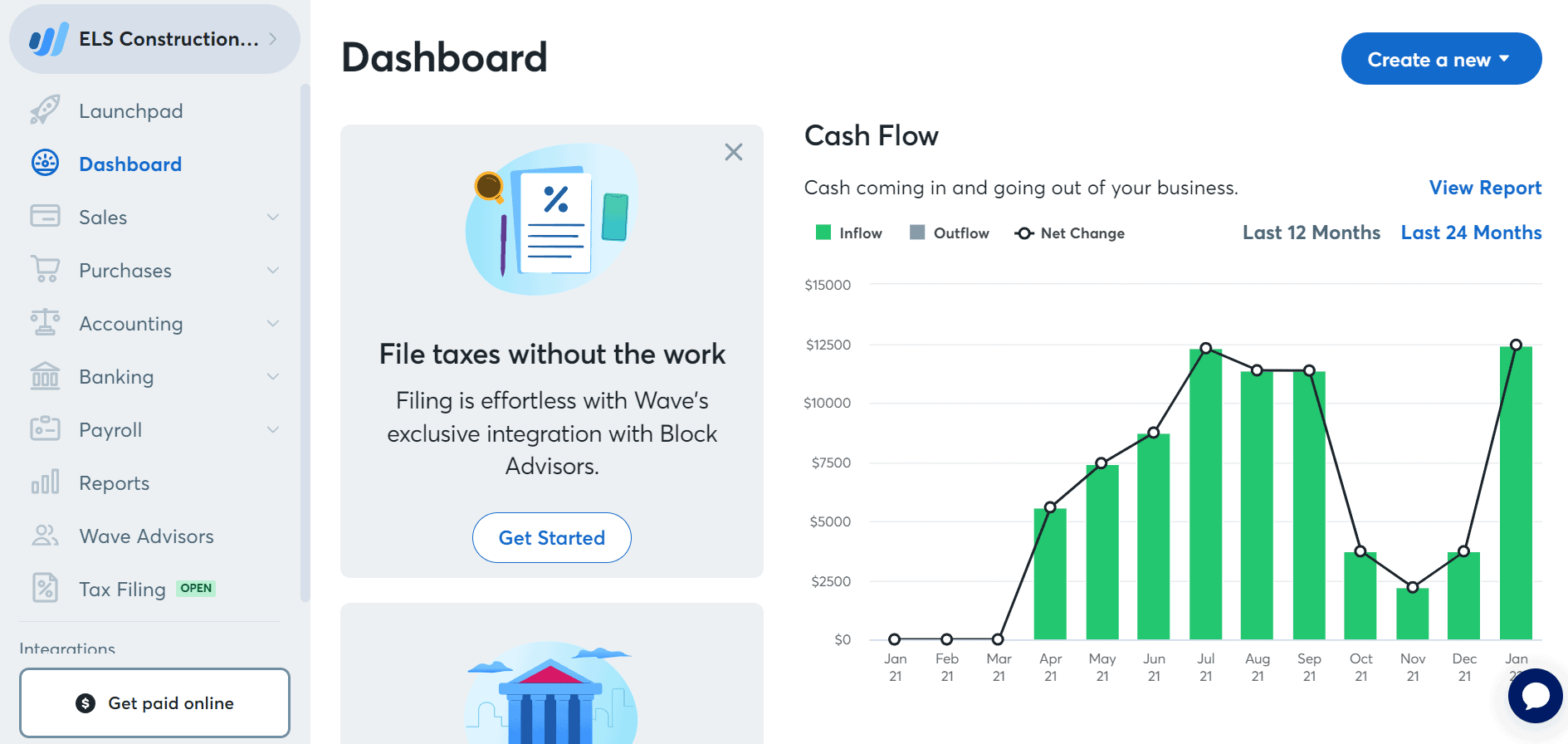
Wave is a fully integrated and simplified solution for small businesses. This free business management software guarantees simple navigation with a clean layout and a consistent login experience. It offers complete online accounting software that includes credit card processing, payroll management, invoicing, billing, tracking payments, and receipt scanning.
With features like bank reconciliation, real-time financial data management, and editable invoice templates, Wave makes bookkeeping easier. Through its credit card processing and automated invoicing features, businesses can allow online payments while generating complete data such as sales tax, balance sheets, cash flow, and profit/loss statements.
Key Features
- Cash flow management
- Invoice creation
- Project accounting
- Revenue recognition
- SSL security
- Purchase order management
Best for: Teams that need to manage accounting and bookkeeping effectively.
Pros
- Easy navigation, aids bookkeeping, simplifies tasks, user-friendly interface.
- Integrates with Stripe, facilitates credit card payments, and it’s free.
- Tracks spending, simplifies budgeting, and easy categorization of transactions.
Cons
- Poor customer service and customers complain of transaction issues.
- Occasional syncing issues and duplicate transactions make accountants uneasy.
8. Slack
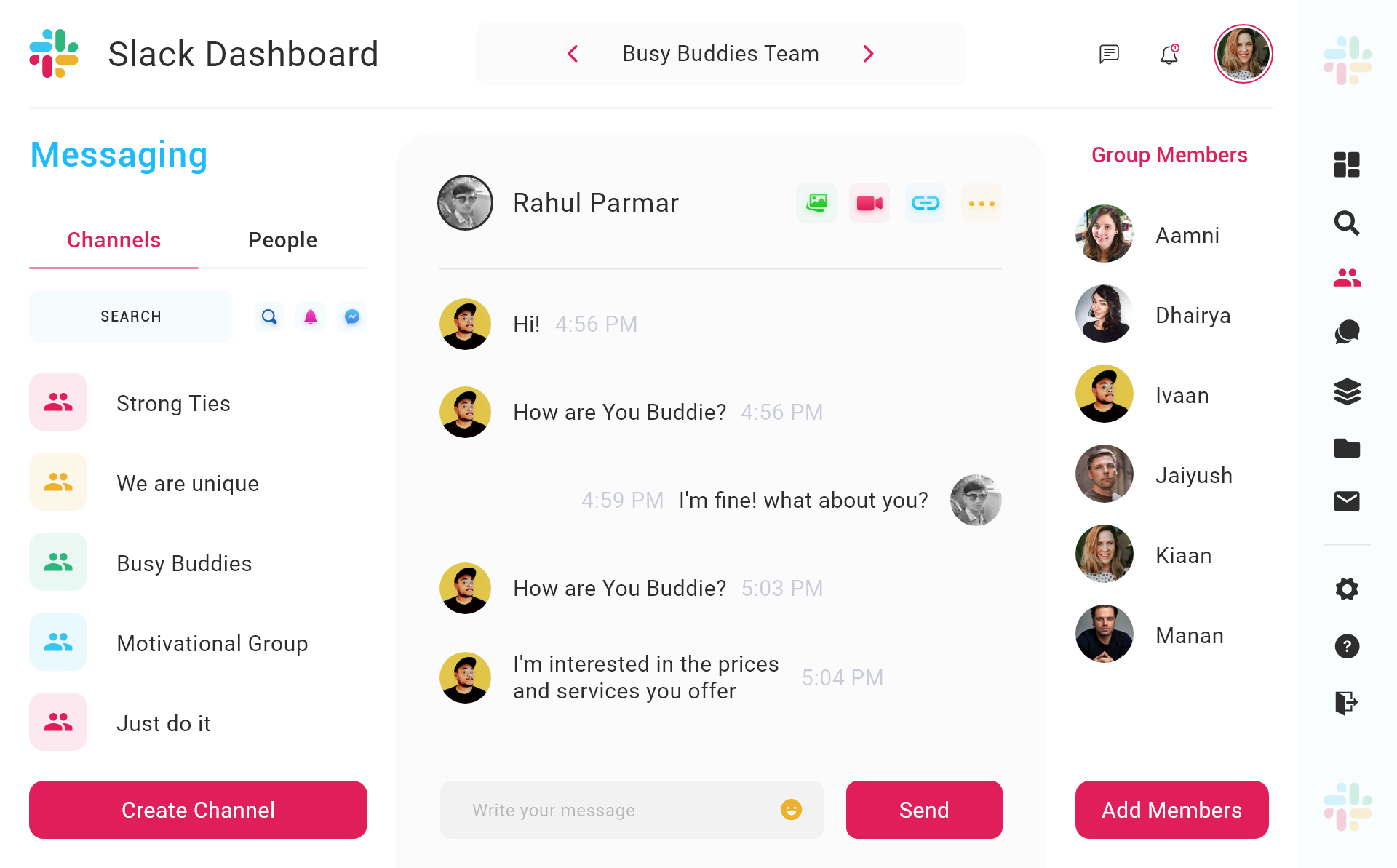
Slack is a cloud-based platform designed for a variety of industries, including technology, finance, and media, that promotes collaboration between organizations. It has direct messaging for immediate colleague communication, private channels for team-specific exchanges, and public channels for more general topics.
Slack’s extensive archive guarantees that all conversations, notifications, and project data are readily retrieved, and users may transfer files in a variety of formats with ease. With synced updates between its iOS and Android apps, customizable notifications improve user control.
Key Features
- Audio capture
- Member directory
- Presentation streaming
- Notes management
- Screen sharing
Best for: Teams looking for effective communication and collaboration.
Pros
- Fast, reliable, easy navigation, ideal for technical support teams.
- Integrates seamlessly with Google Drive, enhancing productivity and collaboration.
- User-friendly setup and allows smooth communication among team members.
Cons
- Messages fail if the connection is lost, causing delays and confusion.
- Notifications can be distracting, impacting focus during work hours.
Disclaimer: Please note that all the platforms mentioned above are freemium. This means that users get access to all the basic features free of cost; however, they will need to make payment for advanced features to scale up and upgrade.
What Types Of Software Do Businesses Need?
Every small business is unique. Take into account your needs and specific pain points when selecting software. Some necessary tools for small businesses are:
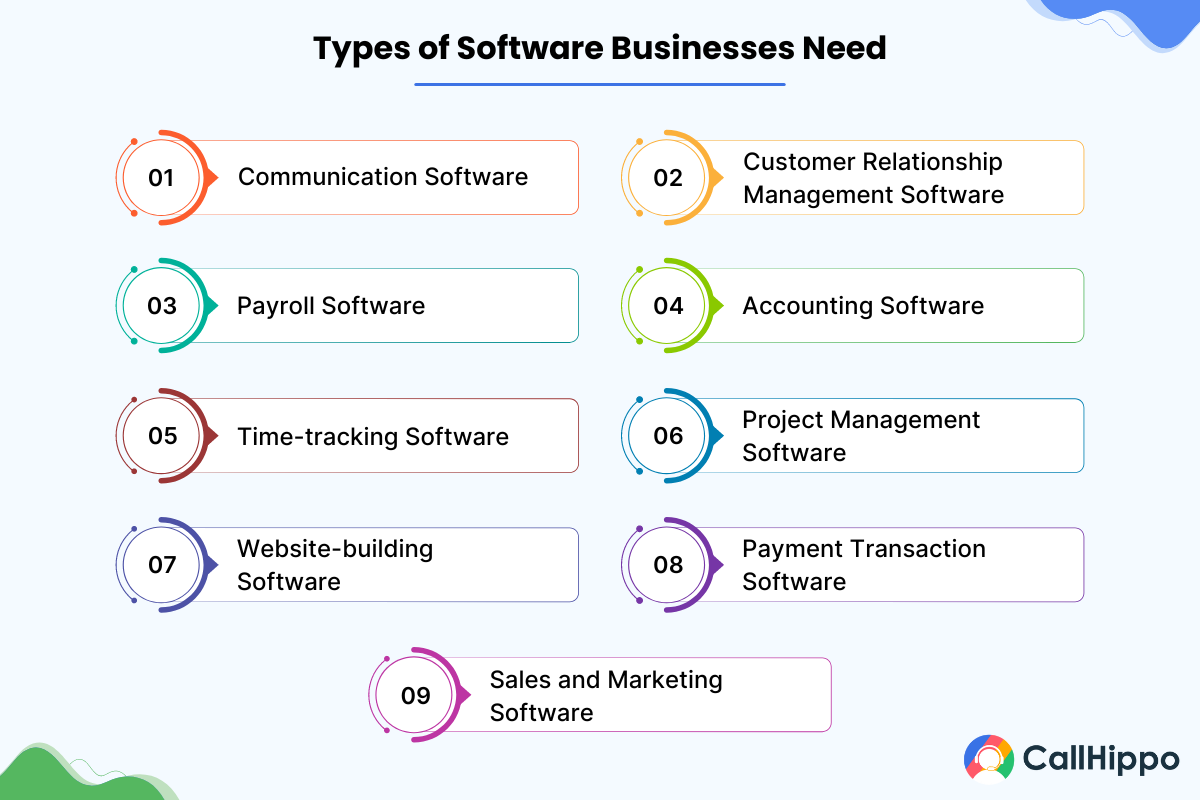
1. Communication Software
Simplifies internal and external communication by allowing the sharing of files, voice, text, and video.
2. Customer Relationship Management Software
Supports data-driven strategy by managing and analyzing customer interactions with past, present, and future clients.
3. Payroll Software
Ensures accurate and timely salary transfers by automating employee payment processes.
4. Accounting Software
Keeps track of spending, organizes workflows, and manages money for long-term financial success. Options like accounting software for Chromebook are ideal for cloud-based access, especially for businesses that operate remotely or use lightweight devices.
5. Time-tracking Software
Keeps track of project hours, which is crucial for professionals who bill by the hour.
6. Project Management Software
Helps with resource planning, organization, and management to ensure deadlines and goals are met.
7. Website-building Software
Gives SMBs an online presence by enabling them to develop websites without knowing any code.
8. Payment Transaction Software
Handles payments, keeps track of client information, and accepts a number of payment options, including PayPal and credit cards.
9. Sales and Marketing Software
Makes it possible to distribute newsletters, start advertising campaigns, and monitor customer journeys and sales funnels.
Integrate CRM with communication systems to reach prospects directly from the CRM dashboard for smooth operations. Let’s now examine a few free specialized software programs that address these needs.
Before committing to a paid plan, leverage free trials of business software to evaluate compatibility and performance. Test functionalities against your specific needs to ensure seamless integration and optimal ROI before making a financial commitment.
Importance of Business Management Software
Modern businesses rely heavily on business management software to centralize processes, increase productivity, and support well-informed decision-making. Combining key departments like finance, operations, HR, and customer service it streamlines processes and boosts output.
Businesses may maximize resources and react quickly to market changes by using real-time analytics, tracking performance metrics, and task automation. It also promotes cross-team cooperation, guarantees legal compliance, and improves customer service, which propels general expansion and sustainability.
Business management software is essential for sustaining competition, growing operations, and achieving long-term success.
When To Consider Upgrading to Paid Versions?
As the requirements of your company surpass the capabilities of free versions, think about upgrading to commercial versions of business software. The signs include:
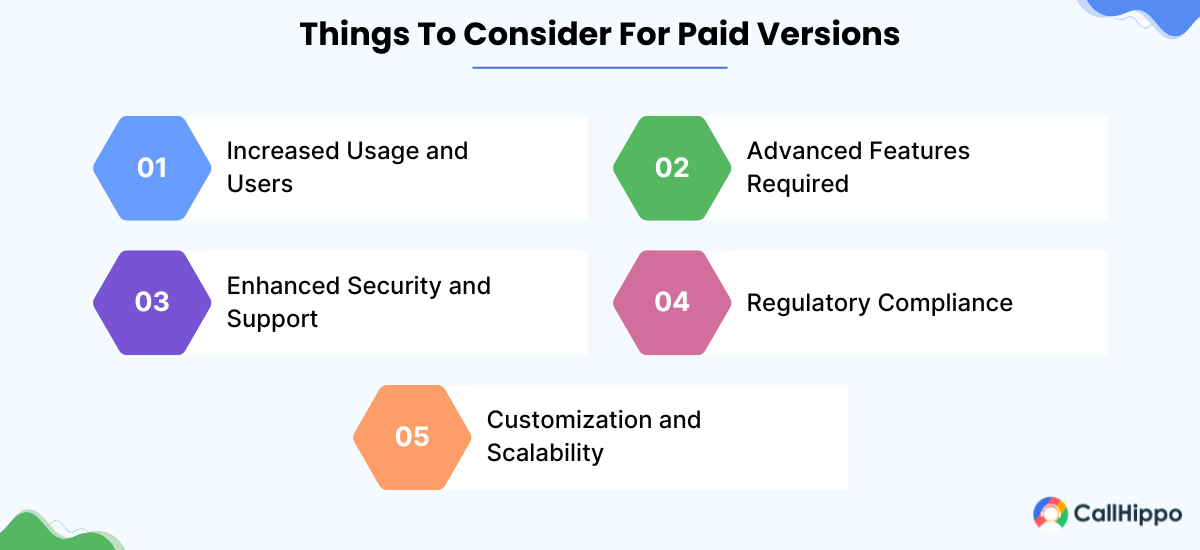
- Increased Usage and Users: When free plans limit user access or impose usage caps.
- Advanced Features Required: To have access to advanced functions critical to business growth, such as extensive analytics, integrations, and customer support.
- Enhanced Security and Support: Paid plans frequently provide greater security measures and dedicated customer support, which is critical as your business grows.
- Regulatory Compliance: If your industry requires strict adherence to specific standards, free versions will fall short.
- Customization and Scalability: Paid plans typically provide additional customization choices and scalability to meet rising business needs.
Conclusion
Using free business management software can be a strategic benefit when starting a new business because it provides necessary tools without requiring a large investment.
While concerns regarding quality are genuine, efficient free business management software can be dependable and powerful, assisting with initial company development and success of a company.
Frequently Asked Questions
1. Is free business management software reliable?
Yes, free business management software can be reliable, offering essential tools without cost. However, reliability may vary based on specific software providers and their support for critical business operations.
2. Can free business management software integrate with other tools?
Yes, free business management software can be integrated with other products to improve functionality and workflow efficiency without investing upfront fees.
3. Is customer support available for free versions of business management software?
Customer service for free business management software varies. Some offer limited help, while others may have community forums or knowledge sources.

Subscribe to our newsletter & never miss our latest news and promotions.









